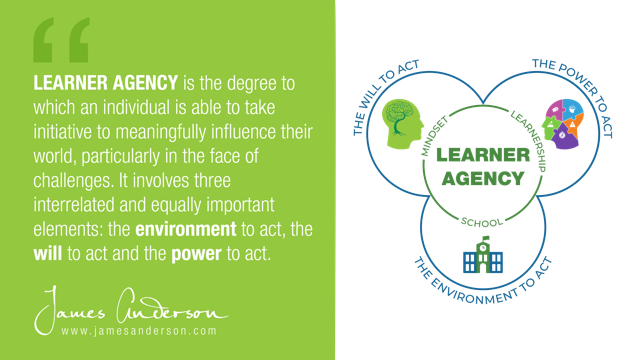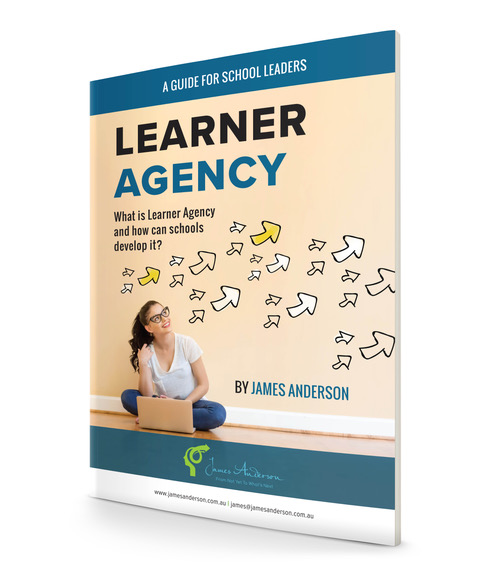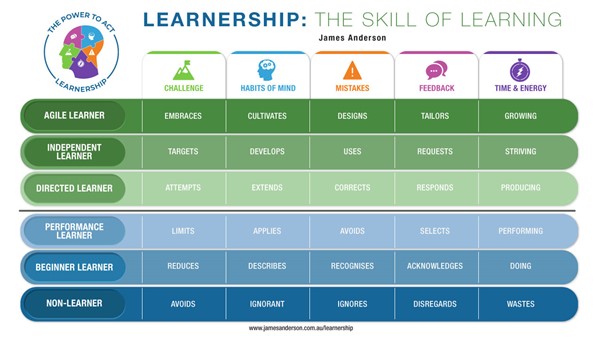Learner Agency – The Role of Learnership
As we explored in my last blog, the concept of Learner Agency is gaining more and more importance around the world. Fortunately, it’s not a new concept – it dates back to at least the 17th century. And teachers who have been following my work on Growth Mindset and Learning Agility find they are ahead of the Learner Agency curve, already adopting many strategies that develop agency in learners.
Defining Learner Agency
Drawing on research and definitions of Learner Agency used by organisations like the OECD, Harvard University’s Achievement Gap Initiative, the International Baccalaureate Organisation, and the Victorian and New Zealand departments of education, I offer the following definition of Learner Agency. This definition synthesises the key ideas to provide teachers with an understanding of what Learner Agency is and a clear direction for developing it in learners.
The result of having agency is that you can choose your path through life. You act on the world rather than letting the world act upon you. You are the master, not the victim, of your circumstances. To draw on the sociological roots of “agency”, you can exercise free will in the world.
It’s an attractive concept. Unfortunately, this vision of people who can choose their path through life is often weakly interpreted. These interpretations talk about giving students agency in the form of “voice and choice” in their learning. Although that’s important, it’s not the whole story.
In the definition I’ve provided, you’ll notice the importance of learners being able to take meaningful initiative, particularly in the face of challenges.
A “sense of agency” or real agency?
In this situation, students may develop a “sense of agency”. They may choose their path through school. But in reality, the teacher is only simulating agency; they are not developing it. The students remain unchanged. They are no more or less able to change their world than before their teacher granted them the opportunity and permission to choose. All the power resides with the teacher.
It is important for educators to understand that agency is not something we can simply give to students. Learner Agency is a capability that needs to be developed by, and within, the learner. Ultimately, learners must carry and continually build their agency throughout their life.
 As I explain in my new white paper, Learner Agency – A Guide for School Leaders, we only have agency over challenges that fall within our current abilities. When we encounter challenges that are too difficult for us, we need to develop our abilities before we can take the initiative to meaningfully influence these challenges.
As I explain in my new white paper, Learner Agency – A Guide for School Leaders, we only have agency over challenges that fall within our current abilities. When we encounter challenges that are too difficult for us, we need to develop our abilities before we can take the initiative to meaningfully influence these challenges.This, of course, is why a Growth Mindset is so important to Learner Agency. Learners must first understand they are able to develop their talents and abilities – a Growth Mindset, the will to act – before they are motivated to develop those abilities. But it is developing those abilities that gives learners the power to act.
Learnership - the skill of learning
This is where Learnership comes into our model of Learner Agency. For students to develop their abilities, they must become skilful learners. They must engage in the learning process in a way that “raises the bar”, allowing them to reach higher standards and succeed at increasingly difficult problems.
The Learnership Matrix below describes what skilful learning looks like. While it’s possible to grow and even excel at school as a Directed Learner, only Independent and Agile Learners have true agency. These individuals take charge of the learning process for themselves.
Schools must be responsible for providing students with an environment to act, free of undue limits. So, the “voice and choice” interpretation of Learner Agency is not wrong; it’s just incomplete. We need to remember that this environment must provide challenges beyond students’ current abilities – tasks that stretch them into their Learning Zone, challenging them to grow – before we can say we are attempting to develop Learner Agency.
For students to take initiative to meaningfully influence their world, particularly in the face of challenges, they must be able to take charge of the learning process, become skilful learners, and develop the power to act for themselves. This is what the concept of Learnership entails.
If you’d like to know more about Learnership and how it relates to Learner Agency, I invite you to visit www.jamesanderson.com.au/learnership or download my Learner Agency – A Guide for School Leaders white paper.
If you’re ready to deepen your work with Learnership, Growth Mindset and Learner Agency, please book a time in my calendar to discuss your school’s learning needs or simply reply to this email.
Best Wishes,
James
Stay connected with news and updates!
Join my mailing list to receive the latest news and updates about mindset, Habits of Mind, Learning Agility and more.
